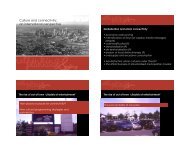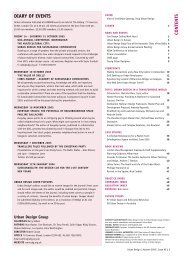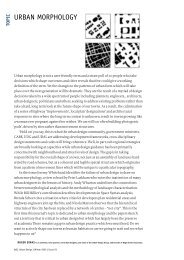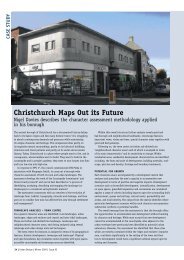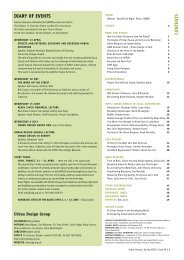topic - urban-design-group.org.uk
topic - urban-design-group.org.uk
topic - urban-design-group.org.uk
You also want an ePaper? Increase the reach of your titles
YUMPU automatically turns print PDFs into web optimized ePapers that Google loves.
PAGE<br />
Royston Robinson Reviews the Recent CABE Urban Design Summer School<br />
and its Focus on Cross-professional Learning<br />
Photos: Rene Bach<br />
WHAT IS URBAN DESIGN?<br />
Urban <strong>design</strong> has often fallen between<br />
two professions – architecture and<br />
planning. This lack of definition has<br />
undoubtedly affected the profession<br />
and currently we are witnessing a<br />
skills crisis: we do not have enough<br />
professionals with the right skills to do<br />
the job. The results are witnessed in the<br />
poor public realm that blights towns<br />
and cities across the UK. We need <strong>urban</strong><br />
<strong>design</strong> professionals to develop the skills<br />
they need to create the sustainable<br />
communities of the future.<br />
CABE, along with key bodies like<br />
the Urban Design Group and Urban<br />
Design Alliance, has made great strides<br />
in putting high quality <strong>urban</strong> <strong>design</strong><br />
at the heart of physical regeneration<br />
in England. Yet, the built environment<br />
sector is still suffering from a lack of<br />
accessible lateral learning; silo-busting<br />
<strong>design</strong> study forums that unite those<br />
who play key roles in how our towns and<br />
cities are built.<br />
With this in mind CABE developed<br />
a partnership with the University of<br />
Westminster in January 2004 to create<br />
and deliver a three and a half day Urban<br />
Design Summer School with the aim<br />
of gathering professionals from across<br />
the sector to tackle jointly the key<br />
challenges in making successful places.<br />
Richard Simmons, CABE’s recently<br />
appointed chief executive said: “No<br />
profession has a monopoly on wisdom<br />
when it comes to <strong>design</strong>ing attractive<br />
and successful places. We have to<br />
deliver a massive programme of public<br />
and private investment to transform<br />
neighbourhoods and build new ones<br />
Work together and<br />
we can create a<br />
heritage future<br />
generations will<br />
look back on with<br />
pride<br />
over the next ten years. Those of us<br />
who have had the privilege to work in<br />
teams which blend the skills of different<br />
professions know they <strong>design</strong> better<br />
environments. If we don’t learn from<br />
this we will repeat the worst mistakes of<br />
the past. Collaboration doesn’t always<br />
come naturally, so developing the skills<br />
and competencies to break through<br />
boundaries is critical. Get it wrong and<br />
we will build neighbourhoods nobody<br />
wants to live in. Work together and we<br />
can create a heritage future generations<br />
will look back on with pride.”<br />
The school took place from June<br />
13th to the 16th following a flurry of<br />
booking activity and substantial oversubscription.<br />
Set in the <strong>design</strong>ated<br />
housing growth area of Ashford, Kent<br />
– a rich source of case studies – the<br />
programme centred on four <strong>design</strong><br />
workshop <strong>group</strong>s, or charrettes. These<br />
tackled:<br />
• estate renewal<br />
• green and brownfield development<br />
• town centre regeneration<br />
• housing intensification.<br />
Delegates were able to choose from two<br />
of the four charrettes, allowing them to<br />
select the sites and issues most relevant<br />
to their own work. From collating site<br />
analyses to producing development<br />
frameworks, the varied backgrounds<br />
and skills sets of the students provided<br />
interesting and lively <strong>group</strong> debate.<br />
Supplementing the charrettes were<br />
an array of skills seminars, keynote<br />
speakers and best practice sessions that<br />
drew on the talents of some of our most<br />
innovative and engaging practitioners,<br />
including:<br />
• Cllr Daniel Moylan, RB Kensington<br />
& Chelsea, tackling street clutter in<br />
Kensington<br />
• Dickon Robinson, Peabody Trust,<br />
explaining the why and how of the<br />
client’s role in <strong>design</strong> excellence<br />
• David Partridge, Argent St Ge<strong>org</strong>e,<br />
describing the masterplanning of Kings<br />
Cross<br />
• Richard Alderton, Ashford Borough<br />
Council, putting Ashford’s opportunities<br />
in context.<br />
Bill Erickson and Sebastian Loew, the<br />
University of Westminster ‘ringmasters’<br />
for the school, provided seamless<br />
continuity to the proceedings,<br />
successfully guiding 72 delegates<br />
on multiple site visits and providing<br />
thought-provoking sessions and<br />
charrette guidance. Plaudits must also<br />
go to Ashford Borough Council and the<br />
planning team who provided peerless<br />
support throughout the programme. From<br />
delivering plenary sessions on Ashford’s<br />
planning strategy, to providing Planning<br />
Member panels in charrette crits, the<br />
borough proved an invaluable ally.<br />
Overall, the event’s greatest success<br />
stems from the delegates’ own energetic,<br />
unflagging participation. The exercise<br />
of planners, engineers, councillors,<br />
architects and others working together,<br />
provoked challenges in professional<br />
pre-conceptions and misconceptions.<br />
On top of learning about the issues of<br />
contemporary <strong>urban</strong> <strong>design</strong>, delegates<br />
learned about the different approaches<br />
and priorities of their peers.<br />
Email addresses were swapped and<br />
local reunions planned. Needless to say,<br />
we are already looking forward to next<br />
year.<br />
For more detailed information about<br />
the summer school visit www.udss.<strong>org</strong>.<br />
<strong>uk</strong>. To get ahead of the game and join<br />
next year’s waiting list, contact Royston<br />
Robinson 020 7960 4890.<br />
10 | Urban Design | Autumn 2004 | Issue 92



